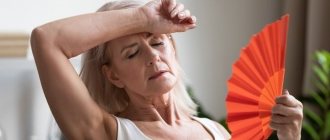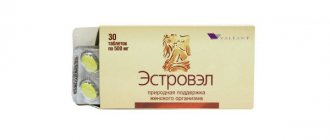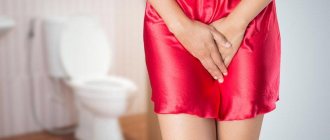Fear is a normal reaction of the body that occurs in the event of a threat or danger, but sometimes it acquires signs of pathology, which often occurs in women during menopause. We are talking about panic attacks during menopause. They are paroxysmal in nature and in most cases are caused by individual characteristics of the central nervous system (CNS).
During menopause, the body undergoes global hormonal changes, in which all systems and organs are involved in the process. This invariably affects a woman’s mental state. In addition, stress during menopause is many times stronger than under normal circumstances. Alarming symptoms are often combined with physiological changes in internal organs and can have varying degrees of manifestation. Such conditions require medical intervention.
What are panic attacks
Panic attacks belong to the category of neurotic disorders, manifested by attacks of causeless fear and inexplicable anxiety.
Manifestations are accompanied by a number of somatic signs:
- increased secretion of sweat glands;
- increased heart rate;
- breathing problems;
- nausea;
- dizziness;
- chills.
Their main feature is the suddenness and unpredictability of their occurrence. Most patients experience a significant difference between subjective sensations and the objective state. In this case, attacks are accompanied by a surge of adrenaline, a sharp narrowing of blood vessels, a decrease in carbon dioxide levels and an increase in the amount of lactic acid in peripheral tissues.
What can cause
Panic attacks during menopause are quite common. They occur in approximately 30% of the fairer sex entering menopause.
The turning point in the life of every woman is associated with physiological changes occurring in the body, which have an impact on the psycho-emotional sphere. When pathological conditions occur during menopause, unpleasant sensations increase significantly. Neurotic attacks can be caused by hormonal imbalance, primarily a decrease in estrogen levels.
Genetic predisposition can play a determining role in their occurrence. In women of reproductive age, nervous system disorders are mild. With the onset of menopause, diseases worsen and their symptoms become more pronounced.
Treatment and symptoms of panic attack in menopause and premenopause
Panic attacks during menopause are not uncommon.
Any turning points in a person’s life a priori become crisis situations. If these “fractures” are associated not only with situational changes in life, but also with physiological changes in the body and hormonal changes in it, then they are most likely to be accompanied by periodic attacks of panic.
The main causes of panic attacks during menopause
When analyzing panic attacks during menopause, one can clearly distinguish their two significant components - psychological and physiological.
Let's consider the physiological reasons first.
Irreversible physiological processes in the body
The physiological component of panic in a woman experiencing menopause is due to irreversible processes occurring in her body. In essence, these are processes of dying, slowing down, fading.
The menopausal period requires a woman to take increased care of herself: adherence to a routine, proper sleep, a balanced diet, avoidance of stress out of nowhere (gossip, squabbles, nervous people), medical examinations. Unfortunately, not all of our women, who actively combine the roles of mothers, wives, successful employees, and often entrepreneurs in life, manage to take care of their own health even before menopause.
Hormonal imbalance, lack of substances necessary for the body (calcium, serotonin) can activate panic attacks against the background of overwork or stress. Menopause, especially its beginning, is already quite a strong stress for the body. The fragile system may not be able to withstand the additional shock; it will react to the disorder with a panic attack.
Drug relief of menopause symptoms
Most women today support these processes with the help of hormones and bioactive drugs, thereby alleviating an unpleasant physical condition.
Being carried away by drugs, women often achieve not improvement, but worsening of their condition. Many such medications have a side effect: they may not alleviate trembling, sweating and fever, but, on the contrary, cause them - but only these will be symptoms of panic.
If we talk about the psychological component of such a complex process as panic, then the internal state of a woman experiencing menopause will fit definitions such as “confusion” and “irritation.” What reasons can cause them?
Turning on the self-triggering panic mechanism due to the similarity of the symptoms of menopause and panic
The symptoms accompanying menopause can be found in common with the first warning signs of a panic attack. This applies to both physical and mental state.
Menopause is often accompanied by somatic symptoms such as sweating, changes in body temperature (either hot or cold), shortness of breath, trembling in the limbs, pressure behind the sternum, which manifest themselves more vividly in some women, and more subdued in others.
Unpleasant physical manifestations are accompanied by psychological ones: increasing anxiety, a feeling of the unreality of what is happening, suspiciousness and fear associated with the experience of allegedly committing erroneous actions.
All these phenomena are characteristic of both panic patients and women in menopause. One is made heavier by the other. Women who have ever suffered from panic attacks may mistake the phenomena accompanying menopause for the onset of a panic attack and be constantly on the alert for panic.
The increased release of adrenaline into the blood, associated with the triggered panic mechanism (which experts compare to a faulty alarm system running idle), can cause such a serious and unpleasant condition that a woman’s loved ones, fearing for her life and health, sometimes call an ambulance ” for her hospitalization.
Keyword: "never"
One elderly lady told a research psychologist how she understood the essence of aging, and explained why menopause was psychologically difficult for her and was accompanied by panic attacks. Here is an excerpt from a recording of a conversation with her:
“It’s not so easy to live when the key word defining your future is “never.” You understand that, most likely, you will never fall in love again - like this, recklessly, so that you don’t care about all the conventions.
You will never give birth to more children - but internally you feel much more strength for this, you perceive motherhood much more meaningfully than when you were twenty, and even thirty years old! You will never have the same sexual joys as in your youth... most likely, not a single man, including your own husband, will even want to look at you... When you understand this, you experience fear, so strong that in comparison even fear from a parachute jump - just a simple tickle. I know, I jumped.
Not all women, unlike this old lady, have the courage to admit what they really feel. Moreover, they do not even admit to themselves, which significantly complicates the process of psychotherapy. After all, awareness of true feelings, primarily negative ones, is not just a huge step on the path to recovery, it is already half the way!
The myth that menopause is life-threatening
There is still a common belief that during menopause a woman’s life is in serious danger. It is as if the body is in such a weakened state that it can betray a serious illness, which the patient will miss, confused by the symptoms of menopause.
Women who have this belief are more susceptible to panic attacks than women who are free from myths, monitor their health, read medical literature and understand that menopause is, albeit irreversible, inevitable, but a completely normal physiological process.
Women with goals in life
A purposeful woman, like any other, is upset by the thought that she is aging, that her body is irreversibly changing. But she never depended on male attention, on constant waist measurements and weighings, on the opinions of others.
And therefore, after menopause, her life will not become less bright and eventful - professionally, creatively, friendly... and sexually, by the way.
She doesn’t feel that she has become less attractive or inferior because she went through menopause - so why should others feel this?
Women who are not afraid or embarrassed to seek help from a psychotherapist and a personal psychological support group
A woman experiencing menopause needs the support of a psychotherapist.
This is normal and worthy of respect: it means that she takes care of herself, wants to get rid of negative experiences and does not want to become a slave to panic attacks and a hostage to physiological changes.
It is also natural for her to turn to significant others for support and confirmation: for her loved ones she has not become worse, they see her attractiveness and will love and appreciate her even after menopause.
Women who have true love
A loved one who is nearby and supports the belief that she is still feminine, beautiful and desirable becomes the best psychotherapist and antidepressant for a woman experiencing menopause.
Next to her lover, who chose her exactly as she is, and who simply will not compare her with others, even younger and more beautiful, a woman will experience menopause as just a new step towards peace and harmony, and not as a collapse or end of the world.
Healthy women
Statistics show that women suffering from migraines, stomach ulcers, cardiovascular diseases, varicose veins, and hypertension during menopause are much more likely to experience panic attacks than their healthy peers. Therefore, it is so important to protect and strengthen your health and treat chronic diseases without waiting for menopause.
Women without bad habits
Bad habits include: alcohol abuse, smoking, excessive addiction to coffee.
Alcohol, cigarettes and coffee will not improve the mental and physical condition of a woman in menopause, but on the contrary, can significantly harm her.
It is no coincidence that the famous Russian psychotherapist Vladimir Levi called the human body the “house of the soul.” In a healthy body, loved and cherished by its owner, mental illness will never settle, panic will never arise. And normative physiological processes, such as menopause, in a healthy person will occur with the least cost for both soul and body.
Source: https://panicheskie-ataki.com/obshhie-voprosy/pri-klimakse.html
Causes of menopause
Not all women experiencing menopause experience panic attacks. During this period, involutional processes associated with the natural aging of the body occur in the reproductive system. Hormonal levels are also undergoing global changes, on which the functioning of the genital organs, muscle and vascular tone, blood pressure levels, the functioning of the central and peripheral nervous system and even metabolism depend.
The menopausal period is divided into three stages: premenopause, menopause, postmenopause. If its development occurs consistently, and the nervous system copes with the task, then the woman’s body gradually adapts to new operating conditions. In the case of an accelerated transition from one phase to another, disturbances occur.
There are a number of diseases and pathological conditions that contribute to the occurrence of neurotic disorders during menopause.
Among them are:
- headaches arising from migraines;
- adrenal gland diseases;
- endocrine disorders;
- pulmonary emphysema;
- heart diseases;
- predisposition to allergies.
The decline of menstrual function during menopause is accompanied by impaired nerve conduction. At the same time, the woman begins to clearly realize that she is getting old. This is what often leads to panic.
Hormonal changes lead to disruption of nervous regulation.
Risk factors that contribute to aggravation of the situation during attacks:
- frequent stress;
- falling into depressive states;
- alcohol abuse;
- smoking;
- nervous disorders;
- lack of sleep.
The causes of anxiety can be external factors that arise against the background of negative events occurring in a woman’s life. This could be injury, accident, death or illness of a loved one.
Panic attacks during menopause: symptoms and treatment
Girls during menopause often experience panic attacks. This indicates the initial stage of menopause. Transformations in the female body apply not only to the internal genital organs. Other changes in the body often occur.
Panic attacks during menopause, the symptoms and treatment of which are described below in the article, can manifest themselves in different ways. In any situation they require correct correction. The interaction of panic attacks with organic transformations in organs is an indication for hormone replacement therapy.
Causes
Menopause in the life of every girl is manifested by different changes in the body. This is a physiological process of transformation of the female reproductive system, during which involutional processes develop.
The hormonal background is varied and ensures the normal functioning of the body, affects metabolism, strengthens vascular tone, stabilizes blood pressure, and controls the functioning of the nervous system.
Thanks to this phenomenon, the female nervous system is characterized by lability. Hormonal disruptions can transform nervous regulation. Therefore, together with disorders of menstrual function during menopause, the work of the psyche is destabilized. Problems with nervous activity arise due to awareness of the fact of aging. This is why panic attacks often occur.
Menopause develops in phases:
- Premenopause is a period of time from 4 years before the onset of menopause.
- Menopause – the time of the last menstrual period occurs at approximately 50 years of age.
- Postmenopause is the time from the last menstruation until the end of life.
Such periods are characterized by successive transformations in the body, if there are no disturbances, but the nervous system functions without failures and adapts to hormonal changes. When there is a rapid transition from one stage to another, various disorders and panic attacks occur.
Therefore, the main reason for the appearance of panic attacks during menopause should be considered a rapidly developing hormonal imbalance, the consequence of which is a problem with the functioning of the central nervous system.
If we consider the pathogenesis of panic attacks during menopause, we need to be aware of the hormonal changes that change metabolic processes in the cerebral cortex.
What are panic attacks?
Attacks are considered features of the nervous system, and not an independent pathology. During this period, girls experience stress. At the same time, the sensations are aggravated many times over. A seizure causes reactions in the body that are expressed by such symptoms.
Often, under the influence of stress, adrenaline and cortisol are created in increased mode, which can provoke a narrowing of blood vessels and an increase in heart rate. Such transformations are caused by an intense volume of blood pressure.
When breathing quickens, patients lose a lot of carbon dioxide from their bodies. Based on this, the blood transforms into acidic characteristics. This greatly aggravates anxiety, causes dizziness, and a feeling of numbness in the arms and legs.
Vascular spasms often affect peripheral tissues. The muscles are not sufficiently supplied with nutrients. The skin produces a lot of lactic acids. When these substances enter the circulatory system, panic intensifies.
The duration of one panic attack is a maximum of half an hour. Such attacks are not isolated. Often such attacks are repeated again.
The mechanism of occurrence indicated above does not differ in women during menopause. This process is affected by a lack of sex hormones that improve mental functioning.
If panic attacks did not occur at one time, their signs begin to appear as menopause develops.
Panic attacks during menopause in girls are expressed by the following symptoms: fear, anxiety in an apparently normal state, heat felt in the upper body, chills, sweating, painful sensations in the head, rapid heartbeat, sleep disorders, nervousness.
When panic attacks occur, the signs are often mistaken for other pathological processes. Therefore, unreasonable fear in a person is the main symptom and distinctive feature of a seizure.
Gynecologist and psychologist treat such conditions.
Based on the effective treatment of gynecological disorders, a psychologist can help patients cope with panic during menopause.
Risk factors
True panic attacks are recorded in 1/6 of the patients during menopause. The chances of occurrence increase with the following disorders: migraine, emphysema, heart and vascular disease, thyroid disorders, problems with the adrenal glands, allergies.
The issue of menopause should be critically considered when girls have previously experienced panic attacks. During menopause, panic attacks can be caused by factors that negatively affect the nervous system: stressful situations and emotional overload, tobacco, alcohol, restraining emotions, sleep problems, physical overload.
With hormonal imbalance during menopause, panic attacks are provoked much more often. It should be borne in mind that panic states may take into account the presence of certain mental disorders. Similar symptoms are characteristic of various phobias and depressive states.
Often panic attacks occur on the basis of post-traumatic disorders in complex injuries, dangerous circumstances, or disasters.
Panic is common in patients with obsessive-compulsive pathologies .
Patients with such diagnoses are regularly afraid of contracting some disease. Such diseases are reflected in their behavior. All pathological processes during menopause become more complicated in girls with similar abnormalities. Therefore, their condition always worsens with the onset of menopause. In such a situation, therapy and consultation with a psychotherapist will be needed. The use of hormones does not make it possible to get rid of such problems. Signs of panic are conventionally divided into physical and mental.
Mental symptoms
Such symptoms are considered predominant because they are pronounced. The following symptoms may occur:
- Approaching danger.
- Fear of death, which after several attacks develops into a fear of contracting a disease, and then into other fears due to health conditions.
- Lump in the throat.
- Fear of losing your mind.
- Derealization, in which the perception of information from auditory and visual receptors is distorted, and what is happening seems to slow down.
- Depersonalization - the girl cannot control her actions and observes them as if from the outside.
- There is a pre-fainting state or a feeling of lightheadedness.
A person’s activity may be restrained or, on the contrary, in a panic, he will try to run somewhere or hide. During seizures, psychological symptoms are not the same.
Therapy
Therapy involves the use of drugs and non-drug agents. The latter include relaxing massage and treatment, breathing exercises, and sessions with a psychotherapist.
Psychotherapeutic techniques help with characteristic mental manifestations , but in combination with antidepressants and sedatives.
Traditional medicine is used as an alternative therapy with regular visits to a specialist.
Medicines
Since panic manifests itself against the background of menopause, one cannot do without hormonal agents or phytoestrogens. In addition to them, the specialist prescribes the following medications: sedatives, tranquilizers, antidepressants.
Complex drugs containing estrogen and progesterone are prescribed as hormonal drugs.
First aid
You won't be able to cope with the seizure, but it is possible to reduce the symptoms. To do this, you need to follow these tips. To stabilize breathing, you need to breathe into a paper bag or clasped palms together. Breathing exercises are performed. Inhalations are performed while the abdomen expands. The exercise is performed in 3 stages. Inhale, hold, exhale, you need 15 approaches.
You will need a distraction from negative thoughts. When chills occur and limbs become numb, you can take a warm bath. When your chest hurts badly, you need to take painkillers.
Prevention
Prevention of panic attacks during menopause is achieved taking into account the following recommendations:
- You need to get good sleep, set aside at least 8 hours for rest, and go to bed before midnight.
- Do not consume alcoholic beverages, tobacco products and other psychotropic drugs.
- Do not expose yourself to nerve irritants.
- Stabilize your rest and work schedule. This eliminates tension.
- Perform simple physical exercises or breathing exercises. Such loads allow you to tone the nervous system.
- Improve your diet, eat less fatty foods, more fruits and vegetables, drink a lot of water.
It is necessary to identify all diseases in time and begin to treat them. With clearly expressed symptoms of the climatic period, it is necessary to restrain hormonal levels. It is not advisable to panic when panic attacks occur.
Source: https://nevrology.net/sindromy-i-zabolevaniya/vegetativnoj-nervnoj-sistemy/panicheskie-ataki/simptomy-i-lechenie-pri-klimakse.html
Symptoms
Panic attacks have physical and mental symptoms. In the first case, we are talking about body sensations, and in the second, about emotional perception, a distorted awareness of what is happening and the emergence of negative thoughts that are fixed in the head. There are also atypical symptoms of the disease.
Mental
Mental disorders when anxiety states occur are predominant. They can have varying degrees of intensity, usually manifesting themselves in the form of phobias.
Such crises are characterized by the occurrence of:
- increased sense of danger;
- fear of death;
- unreasonable fear of getting sick or losing something in life.
The manifestations are accompanied by unpleasant and rather specific symptoms.
During attacks, patients experience:
- difficulty swallowing;
- distortion of sound and visual perception;
- slowness of the thought process;
- loss of the ability to control one’s actions;
- falling into a pre-fainting state;
- feeling of faintness.
Crises in women during menopause can be repeated at different intervals. The frequency of their occurrence decreases with more severe symptoms.
Physical
Physical symptoms include those caused by changes at the physiological level. During a crisis, there is an intense release of adrenaline into the blood.
Manifestations are accompanied by:
- increased heart rate;
- increased breathing;
- changes in vascular tone and narrowing;
- sudden onsets of heat, sometimes followed by flashes of cold;
- increased secretion of sweat glands;
- dry mouth;
- stool disorder.
Functional disorders of the gastrointestinal tract (GIT) may be accompanied by attacks of nausea, vomiting, and discomfort in the epigastric region.
During panic, symptoms are often supplemented by:
- cold extremities;
- chest pain;
- trembling, chills;
- weakness, malaise;
- dizziness;
- unrealistic perception of the surrounding world.
The duration of the attack varies from 10 minutes to half an hour. After it ends, the woman may vomit or urinate.
Non-standard
Sometimes panic attacks in women manifest themselves in unusual ways. Their occurrence is accompanied by internal emotional tension, while physical symptoms may be absent. Patients also do not experience feelings of fear.
Causes
Menopause in the life of every girl is manifested by different changes in the body. This is a physiological process of transformation of the female reproductive system, during which involutional processes develop. The hormonal background is varied and ensures the normal functioning of the body, affects metabolism, strengthens vascular tone, stabilizes blood pressure, and controls the functioning of the nervous system.
Thanks to this phenomenon, the female nervous system is characterized by lability. Hormonal disruptions can transform nervous regulation. Therefore, together with disorders of menstrual function during menopause, the work of the psyche is destabilized. Problems with nervous activity arise due to awareness of the fact of aging. This is why panic attacks often occur.
Menopause develops in phases:
- Premenopause is a period of time from 4 years before the onset of menopause.
- Menopause – the time of the last menstrual period occurs at approximately 50 years of age.
- Postmenopause is the time from the last menstruation until the end of life.
Such periods are characterized by successive transformations in the body, if there are no disturbances, but the nervous system functions without failures and adapts to hormonal changes. When there is a rapid transition from one stage to another, various disorders and panic attacks occur.
Therefore, the main reason for the appearance of panic attacks during menopause should be considered a rapidly developing hormonal imbalance, the consequence of which is a problem with the functioning of the central nervous system.
Diagnostics
Diagnosis of attacks during menopause requires a special approach. It is expected to collect anamnesis, study the signs of the disease and differentiate pathological manifestations from other mental disorders and diseases with similar symptoms.
These include:
- vegetative-vascular dystonia;
- arterial hypertension;
- acute form of neurosis.
An examination by a gynecologist and tests to determine the level of sex hormones are provided. In this way, the relationship between disorders and menopause is established.
In order to determine the general state of the body, including the functioning of the kidneys, the following are prescribed:
- general blood and urine analysis;
- blood chemistry.
During the diagnostic process, women undergo echoencephalography - the study of cerebral blood supply. The examination allows us to identify organic pathologies, cerebral ischemia and differentiate manifestations from involutive changes in tissue at the cellular level.
To exclude heart diseases, electrocardiography is performed.
First aid
You cannot cope with panic attacks on your own. However, it is quite possible to significantly alleviate the condition.
To do this, the following actions are recommended:
- Perform breathing exercises on a count: on the count of three, take a deep breath, then pause, and on the count of five, exhale slowly. Repeat 15 times.
- Breathe into your palms or bag for a few minutes. This method will normalize breathing and regulate the level of carbon dioxide in the blood.
- Divert attention from an anxious state. These measures help delay the time of the attack. To do this, put a rubber band on your wrist and snap it. You can count houses or trees along the road.
- Take a warm bath if you feel chills. This should not be done for women with high blood pressure.
- Cough a little if your heart beats fast.
Factors influencing panic attacks
The likelihood of attacks during menopause increases if a woman has previously experienced them. Also at risk are women with the following problems:
- migraine;
- pathologies of the cardiovascular system;
- allergy;
- drinking alcohol or smoking;
- diseases of the thyroid gland and adrenal glands.
The likelihood of attacks is very high if a woman often had to experience stress or restrain negative emotions. Hard physical work also has an adverse effect on your emotional state.
Treatment
Any neurotic disorder requires taking effective measures. There are different methods of treating this disease. The most effective of them is medication.
Drugs
Menopausal neurosis requires complex therapy. Antidepressants, psychotropics, sedatives and hormonal drugs are used.
Depending on the indications, the following may be prescribed:
- Logest is a high-dose hormonal drug produced in the form of capsules. Its main components are gestagen and estradiol. Used to correct hormonal levels and prevent genital cancer. The course of treatment with a daily dose of 1 capsule is three weeks. During its passage, side effects are possible in the form of gastrointestinal disorders and asthenovegetative reactions: increased vaginal discharge, engorgement of the mammary glands.
- Triziston is a hormonal drug used in complex replacement therapy. Regulates the level of hormones in the blood, normalizes brain function, and reduces the intensity of panic attacks. The drug is used according to a special regimen. The course of treatment varies from three to six months. Contraindications to the use of Triziston are: cancer, thrombosis, arterial hypertension, liver disease, all forms of diabetes, a tendency to develop allergic reactions.
- Velkasin is an antidepressant that is used simultaneously with hormones. Complex therapy allows you to increase the number of molecules responsible for the transmission of nerve impulses and increase the number of mediators that reduce fear and relieve depression. The drug is contraindicated for liver and kidney diseases. Use strictly as prescribed by a doctor.
In addition, when treating attacks, plant-based sedatives are used: Novo-passit, Persen. In addition to their calming effect, they have the ability to normalize hormonal balance.
Folk remedies
Unconventional methods of combating panic attacks during menopause have become widely used.
There are several proven recipes:
- Infusion of hawthorn with motherwort to calm the nervous system. To prepare, you need to take 1 tbsp of leaves of each herb. l., pour a liter of boiling water over them, put on chalked heat and boil for 5 minutes. After preparation, cool, strain and take half a glass daily for a three-week course of treatment.
- Tincture of nut membranes to normalize hormonal levels. It is prepared as follows: the walnut membranes should be poured with boiling water and boiled for 3-5 minutes, then the water should be drained, the resulting raw material should be poured with 125 ml of high-quality vodka and left to infuse in a dark place for a week. Take 1 tsp. twice a day, after adding the same amount of water to the solution.
- Soothing infusion based on medicinal herbs. Recipe: take chamomile, calendula, mint and lemon balm flowers in equal parts, mix. Brew like tea, at the rate of 1 tsp. herbs per glass of water. Drink one glass a day until anxiety symptoms decrease. To improve the taste, you can add a little honey to the drink.
In most cases, folk remedies are used as auxiliaries.
Modern treatment methods
In addition to medications, other, more modern methods of therapy are used in the treatment of neurotic disorders.
The most popular among them are:
- hypnosis;
- psychotherapy;
- aromatherapy;
- massages;
- phytotherapy;
- breathing techniques.
The desired effect during menopause is achieved through moderate physical activity. Any positive emotions, passion for what you love, a positive attitude towards life, and communication are important.
In particular, treatment with hypnosis involves introducing the patient into a state of hypnotic sleep, during which she is given appropriate instructions. Psychiatrists practice such sessions. The disadvantages of this technique are that hypnosis is not suitable for everyone, and the effect of such exposure may be short-lived.
Possible complications
Possible complications of attacks may include functional disorders of the cardiovascular and nervous systems, manifested in the form of tachycardia, increased blood pressure, and decreased temperature in the extremities.
Against the background of frequently recurring panic attacks during menopause, women experience:
- decreased performance;
- deterioration of general well-being and mental state;
- disruption of the usual rhythm of life and a decrease in its quality.
With timely detection of pathology and treatment, the prognosis for recovery in most cases is favorable.
Lifestyle changes
A healthy lifestyle that includes regular exercise can significantly reduce anxiety.
Doctors believe that following a healthy lifestyle can reduce menopausal symptoms and reduce panic attacks.
Regular light exercise can significantly reduce anxiety levels. Women going through perimenopause should choose a range of favorite exercises to do daily. Walking, running, swimming or yoga can all help lower nervous energy and ease symptoms of anxiety. Alcohol and antidepressants can make anxiety worse.
Acupuncture can be effective in both reducing anxiety and easing other menopausal symptoms.
Getting enough quality sleep is important for reducing anxiety. However, women who go through menopause often sleep poorly due to night sweats caused by hormonal changes.
Prevention
It is possible to reduce the likelihood of unpleasant manifestations during the menopausal period with the help of preventive measures.
For this it is recommended:
- lead a correct lifestyle;
- get rid of bad habits;
- adjust your diet by limiting the consumption of fats and carbohydrates; you should include more fresh fruits and vegetables in your daily menu;
- allocate sufficient time for sleep and rest.
You should also try to avoid stressful situations and include exercise in your daily routine. It should be borne in mind that only moderate physical activity will be beneficial. The best options in this case are brisk walking, running, cycling and swimming.
Reviews
During menopause, I was diagnosed with panic attacks. The psychiatrist advised me to take a course in hypnosis. Relief came after the first session. In addition, I had to take hormones and sedatives. At the moment I feel fine. There were no more anxiety conditions.
Anastasia, 55 years old, Moscow
During menopause, from time to time I experienced feelings of fear and anxious thoughts. I decided not to see a doctor, but began to act on my own. True, I read about what measures to take in the medical literature. She quit smoking, began taking walks in the fresh air, and used nutshell tincture and soothing mint tea for treatment. After two and a half months, the unpleasant symptoms completely disappeared.
Natalya, 45 years old, Samara
I began to experience a feeling of increased anxiety and a feeling of unreasonable worry and fear. I decided to see a psychiatrist, after which I was diagnosed with a neurotic disorder during menopause. The doctor prescribed tranquilizers and prescribed a course of hormone replacement therapy, explaining that she would definitely have to undergo treatment. I took all the pills for three months. Now I remember with horror my recent condition. At the moment, nothing like this is observed, I feel calm and confident.
Irina, 52 years old, Kyiv
What are the features of panic attacks during menopause?
During an attack, a huge amount of stress hormones are released into the blood. As a result, the following symptoms appear:
- dizziness or headache;
- lack of oxygen;
- rapid pulse;
- a sharp increase in blood pressure;
- nausea;
- weakness, chills;
- numbness of the limbs.
The condition may closely resemble fainting. Because of such severe manifestations, the lines between reality are blurred, everything happens as if in a fog. The duration of the attack varies. It can last from a few minutes to several hours.
Often a panic attack resembles a heart attack. A woman feels a tingling, burning or pressing pain in the heart area.
After an attack, a woman fears for her mental health, and this provokes new panic attacks.
To prevent new attacks, you must immediately consult a doctor.










